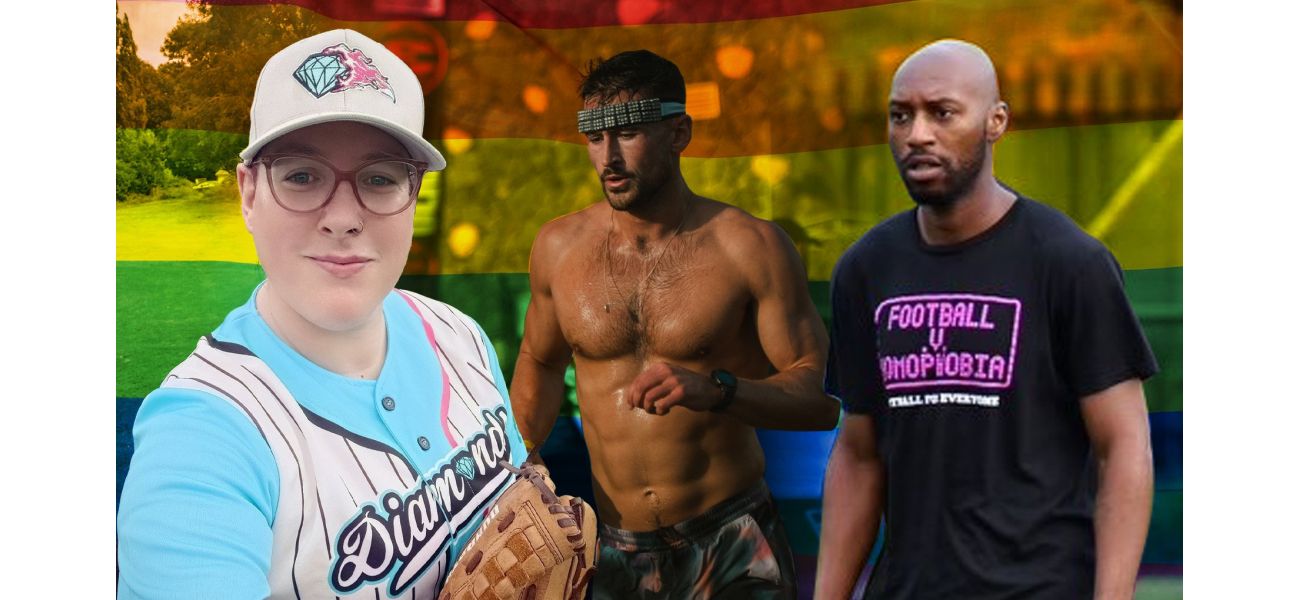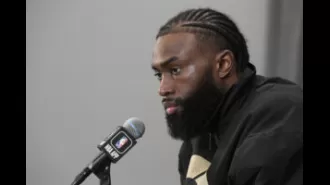Fearful of being open about being transgender, I was once apprehensive about participating in sports.
Everyone should have access to sports, regardless of their identity or abilities.
November 30th 2024.

For members of the LGBTQ+ community, sports can often be a place of acceptance and belonging. This was certainly the case for Daisy Taylor, a trans woman from Loughborough who struggled to feel comfortable in male-dominated spaces. However, when she joined a local LGBTQ+ football club, she finally felt like she could truly be herself.
At first, Daisy found solace in the mixed club, but she soon realized that something was missing - a team made up of solely women. Unfortunately, there are some who believe that trans individuals, particularly trans women, should not be allowed to compete alongside cisgender women. This has led to governing bodies in various sports introducing bans, citing concerns about fairness and safety.
This issue came to a head during the Paris Olympics when boxer Imane Khelif faced scrutiny over her eligibility to compete in the women's division. Despite being identified as female since birth, Khelif was disqualified for "not meeting" the gender eligibility test. However, the International Olympic Committee has made it clear that Khelif has every right to compete in the women's division and emphasized that this is not a "transgender issue."
Daisy, like many other LGBTQ+ individuals, has experienced firsthand the discrimination and exclusion that still exists in the world of sports. This is reflected in a recent study by Stonewall, which found that a quarter of LGBTQ+ individuals do not feel welcome in community sports teams, and a similar number feel unwelcome at live sports events. Additionally, one in five were discriminated against at a sporting event in the last year, and a third feel unable to go to a pub to watch a game.
In light of these findings, Stonewall has launched its annual Rainbow Laces campaign, which encourages sports teams at all levels to show their support for LGBTQ+ inclusion by wearing rainbow laces. For Daisy, this campaign is especially important as she now plays for Vicky Park Queens, a grassroots club for women and non-binary individuals that is not under the jurisdiction of the Football Association's guidelines on trans individuals.
Despite this, Daisy still feels the need to change into her uniform at home, as she fears discrimination and backlash in sports. This is an issue that Jake Williamson, a Stonewall sports champion, can relate to. Having been kicked off a football team in his youth for being gay, he is now an advocate for LGBTQ+ inclusion in sports and a champion of hyrox, a hybrid race that involves both running and fitness movements.
Jake, who wrote a dissertation on homophobia in sports, shares that the chant "Chelsea rent boy" is a common occurrence at football games, even during matches against rival teams. This highlights the need for continued efforts to make sports a safe and inclusive space for all individuals, regardless of their sexual orientation or gender identity. As Jake says, "sport should not be a privilege just for those who fit into certain boxes."
For LGBTQ+ athletes, sports is not just a game, it is a place where they can truly belong and feel accepted. Daisy Taylor, a trans woman from Loughborough, found this sense of belonging when she joined a local LGBTQ+ football club. She had never felt comfortable in male-dominated spaces and this feeling only intensified after she came out. The inclusive environment of the Leicester Wildcats helped her feel at home for a while, but she soon realized that something was still missing - the presence of other women.
Unfortunately, not everyone is accepting of LGBTQ+ athletes. Anti-trans campaigners argue that trans people, especially trans women, should not be allowed to compete alongside cisgender women. Governing bodies for various sports such as rugby, athletics, netball, cricket, and cycling have even introduced bans to ensure "fairness and safety." These policies are based on the belief that the sex assigned at birth can significantly impact athletic performance.
This debate reached its peak during the Paris Olympics when Algerian boxer Imane Khelif faced questions about her eligibility to compete in the women's welterweight division. Her victory against Angela Carini of Italy brought attention to the decision made by the International Boxing Association last year to disqualify Khelif, who has identified as female since birth, for not meeting their gender eligibility test. However, the International Olympic Committee has publicly stated that Khelif has every right to compete in the women's division and emphasized that this is not a "transgender issue."
Daisy, who also plays football, baseball, and squash, shares her experience of the loud and constant narrative surrounding trans women in sports. She tells Metro that it made her feel like she could never truly be accepted among her female peers. This sentiment is not unique to Daisy; new research from Stonewall shows that LGBTQ+ individuals still feel unwelcome and unsafe while watching and playing sports. According to their survey, one in four queer people do not feel welcome in community sports teams, and the same number feel unwelcome at live sports events. Additionally, about a fifth have experienced discrimination at a live sporting event in the last year, and a third feel uncomfortable going to a pub to watch a game.
These statistics were released as Stonewall's annual Rainbow Laces campaign begins. This campaign aims to promote LGBTQ+ inclusion in sports, with both professional and local teams tying up their boots with rainbow laces. Stonewall CEO Simon Black emphasizes the importance of this campaign, stating that everyone, regardless of their athletic abilities, should help make sport and fitness safe and inclusive for all.
Daisy now plays for Vicky Park Queens, a grassroots club for women and non-binary individuals. Unlike other clubs, Vicky Park Queens does not fall under the jurisdiction of the Football Association, meaning they do not need approval to allow trans people to compete. However, Daisy still feels the need to change into her uniform at home, showing that even in LGBTQ+ inclusive spaces, there is still fear and hesitation. She believes that sport should not be a privilege reserved for those who fit into certain boxes, and Jake Williamson, a 26-year-old hyrox champion and Stonewall sports champion, agrees.
Jake has experienced homophobia in sports firsthand, from being kicked out of a football team because of his sexuality to hearing the chant "Chelsea rent boy" at games. He is passionate about making a difference in the world of sports and even wrote his dissertation on the policing strategies around Stamford Bridge, where this homophobic chant is often heard. For Jake, this chant has become the soundtrack of most Chelsea matches.
In conclusion, for LGBTQ+ athletes, sports is not just about winning or losing; it is about finding a sense of belonging and acceptance. It is about being able to participate in something they love without fear of discrimination or judgment. The fight for LGBTQ+ inclusion in sports is ongoing, but with campaigns like Rainbow Laces and the bravery of athletes like Daisy and Jake, we can hope for a more inclusive and accepting future in the world of sports.
At first, Daisy found solace in the mixed club, but she soon realized that something was missing - a team made up of solely women. Unfortunately, there are some who believe that trans individuals, particularly trans women, should not be allowed to compete alongside cisgender women. This has led to governing bodies in various sports introducing bans, citing concerns about fairness and safety.
This issue came to a head during the Paris Olympics when boxer Imane Khelif faced scrutiny over her eligibility to compete in the women's division. Despite being identified as female since birth, Khelif was disqualified for "not meeting" the gender eligibility test. However, the International Olympic Committee has made it clear that Khelif has every right to compete in the women's division and emphasized that this is not a "transgender issue."
Daisy, like many other LGBTQ+ individuals, has experienced firsthand the discrimination and exclusion that still exists in the world of sports. This is reflected in a recent study by Stonewall, which found that a quarter of LGBTQ+ individuals do not feel welcome in community sports teams, and a similar number feel unwelcome at live sports events. Additionally, one in five were discriminated against at a sporting event in the last year, and a third feel unable to go to a pub to watch a game.
In light of these findings, Stonewall has launched its annual Rainbow Laces campaign, which encourages sports teams at all levels to show their support for LGBTQ+ inclusion by wearing rainbow laces. For Daisy, this campaign is especially important as she now plays for Vicky Park Queens, a grassroots club for women and non-binary individuals that is not under the jurisdiction of the Football Association's guidelines on trans individuals.
Despite this, Daisy still feels the need to change into her uniform at home, as she fears discrimination and backlash in sports. This is an issue that Jake Williamson, a Stonewall sports champion, can relate to. Having been kicked off a football team in his youth for being gay, he is now an advocate for LGBTQ+ inclusion in sports and a champion of hyrox, a hybrid race that involves both running and fitness movements.
Jake, who wrote a dissertation on homophobia in sports, shares that the chant "Chelsea rent boy" is a common occurrence at football games, even during matches against rival teams. This highlights the need for continued efforts to make sports a safe and inclusive space for all individuals, regardless of their sexual orientation or gender identity. As Jake says, "sport should not be a privilege just for those who fit into certain boxes."
For LGBTQ+ athletes, sports is not just a game, it is a place where they can truly belong and feel accepted. Daisy Taylor, a trans woman from Loughborough, found this sense of belonging when she joined a local LGBTQ+ football club. She had never felt comfortable in male-dominated spaces and this feeling only intensified after she came out. The inclusive environment of the Leicester Wildcats helped her feel at home for a while, but she soon realized that something was still missing - the presence of other women.
Unfortunately, not everyone is accepting of LGBTQ+ athletes. Anti-trans campaigners argue that trans people, especially trans women, should not be allowed to compete alongside cisgender women. Governing bodies for various sports such as rugby, athletics, netball, cricket, and cycling have even introduced bans to ensure "fairness and safety." These policies are based on the belief that the sex assigned at birth can significantly impact athletic performance.
This debate reached its peak during the Paris Olympics when Algerian boxer Imane Khelif faced questions about her eligibility to compete in the women's welterweight division. Her victory against Angela Carini of Italy brought attention to the decision made by the International Boxing Association last year to disqualify Khelif, who has identified as female since birth, for not meeting their gender eligibility test. However, the International Olympic Committee has publicly stated that Khelif has every right to compete in the women's division and emphasized that this is not a "transgender issue."
Daisy, who also plays football, baseball, and squash, shares her experience of the loud and constant narrative surrounding trans women in sports. She tells Metro that it made her feel like she could never truly be accepted among her female peers. This sentiment is not unique to Daisy; new research from Stonewall shows that LGBTQ+ individuals still feel unwelcome and unsafe while watching and playing sports. According to their survey, one in four queer people do not feel welcome in community sports teams, and the same number feel unwelcome at live sports events. Additionally, about a fifth have experienced discrimination at a live sporting event in the last year, and a third feel uncomfortable going to a pub to watch a game.
These statistics were released as Stonewall's annual Rainbow Laces campaign begins. This campaign aims to promote LGBTQ+ inclusion in sports, with both professional and local teams tying up their boots with rainbow laces. Stonewall CEO Simon Black emphasizes the importance of this campaign, stating that everyone, regardless of their athletic abilities, should help make sport and fitness safe and inclusive for all.
Daisy now plays for Vicky Park Queens, a grassroots club for women and non-binary individuals. Unlike other clubs, Vicky Park Queens does not fall under the jurisdiction of the Football Association, meaning they do not need approval to allow trans people to compete. However, Daisy still feels the need to change into her uniform at home, showing that even in LGBTQ+ inclusive spaces, there is still fear and hesitation. She believes that sport should not be a privilege reserved for those who fit into certain boxes, and Jake Williamson, a 26-year-old hyrox champion and Stonewall sports champion, agrees.
Jake has experienced homophobia in sports firsthand, from being kicked out of a football team because of his sexuality to hearing the chant "Chelsea rent boy" at games. He is passionate about making a difference in the world of sports and even wrote his dissertation on the policing strategies around Stamford Bridge, where this homophobic chant is often heard. For Jake, this chant has become the soundtrack of most Chelsea matches.
In conclusion, for LGBTQ+ athletes, sports is not just about winning or losing; it is about finding a sense of belonging and acceptance. It is about being able to participate in something they love without fear of discrimination or judgment. The fight for LGBTQ+ inclusion in sports is ongoing, but with campaigns like Rainbow Laces and the bravery of athletes like Daisy and Jake, we can hope for a more inclusive and accepting future in the world of sports.
[This article has been trending online recently and has been generated with AI. Your feed is customized.]
[Generative AI is experimental.]
0
0
Submit Comment





